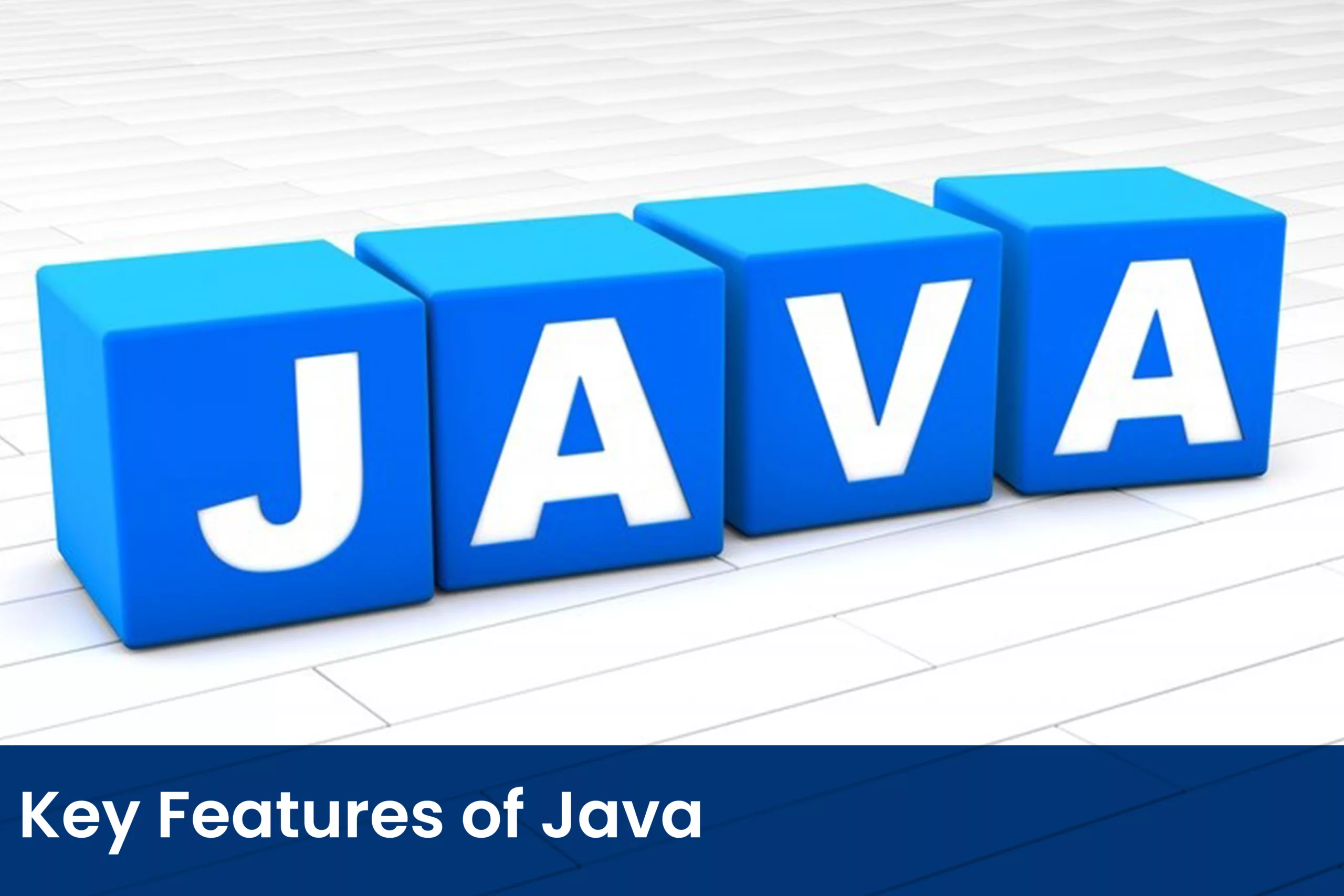As of 2022, Java is the second most popular language for software development, with 43.07% usage. This indicates that Java’s demand is growing rapidly and is projected to increase even more in the coming years.
In this article, we’ll explore the importance of Java in modern software development. We’d also take a look at the key features of Java and the reason behind its popularity. From game development to big data and IoT, we’ll dive deep into Java’s application.
So, let’s get started.
Key Features of Java

Java is a versatile programming language known for its robustness and portability. Its popularity in the modern software development process is attributed to several key features. These features make Java an excellent choice for a wide range of applications, from web and mobile development to enterprise-level systems. Let’s explore these key features in detail:
Platform Independence
One of the most significant advantages of Java is its platform independence. Java applications run on any platform or operating system with a compatible Java Virtual Machine (JVM). This “Write Once, Run Anywhere” language allows developers to write code on one platform and execute it on another without modification.
This platform independence is achieved through bytecode compilation, where Java source code is compiled into an intermediate bytecode JVM executes. This ensures that Java applications are not tied to a specific hardware or operating system, making them highly portable.
Strongly-Typed Language
Java is a strongly typed language, which means that all variables must have a defined data type. This strict typing system helps catch errors at compile-time rather than runtime, enhancing code reliability and maintenance.
Strong typing also promotes better code documentation and readability, as it is clear what kind of data a variable can hold.
Object-Oriented Programming (OOP)
As Object-Oriented Programming (OOP), Java promotes modular and reusable code. Everything in Java is an object, which allows Java developers to create well-structured, organized, and maintainable code.
OOP concepts like classes, objects, inheritance, encapsulation, and polymorphism are fundamental in Java. This makes it an ideal choice for building complex software systems.
Robust and Secure
Java’s importance and robustness are evident for handling runtime errors gracefully and preventing crashes and system failures. Features like exception handling and memory management (automatic garbage collection) contribute to Java’s robustness.
Security is a top priority in Java. The language incorporates multiple security layers, including a robust security manager, to protect against unauthorized access, viruses, and other security threats. This makes Java a trusted choice for applications that require a high level of security.
Large Standard Library (Java API)
Java boasts a comprehensive Standard Library known as the Java API (Application Programming Interface). This library provides pre-built classes and methods for common tasks, reducing development time and effort.
The Java API covers a wide range of functionalities, from I/O operations and data manipulation to networking, graphics, and database connectivity. This extensive library simplifies the development of complex applications.
Java in Web Development

Java has a significant role in web development, particularly on the server side. It offers robust tools and frameworks that enable developers to create scalable, secure, and high-performance web applications. Below is how Java is used in web development.
Server-Side Development
Java is a popular choice for server-side development, where it handles the logic and data processing for web applications. Its server-side capabilities are powered by technologies like Servlets, JavaServer Pages (JSP), and Enterprise JavaBeans (EJB).
Servlets are Java classes that extend the functionality of a web server and provide dynamic content generation. They are the building blocks of Java web applications.
Java Web Frameworks
Java offers a wide range of web frameworks that simplify the development of web applications. Some of the most prominent Java web frameworks include:
- Spring Framework: Spring is a comprehensive framework that provides modules for various aspects of web development, including dependency injection, data access, security, and more. Spring Boot, a part of the Spring ecosystem, streamlines application setup and development, making it a top choice for Java developers.
- JavaServer Faces (JSF): JSF is a component-based web framework that simplifies the creation of user interfaces for web applications. It offers reusable UI components and a well-defined structure for building web interfaces.
- Struts: Apache Struts is an open-source framework that builds web applications with Model-View-Controller (MVC) architecture. It provides features for handling requests, managing application flow, and rendering views.
Database Connectivity
Java provides robust database connectivity options through technologies like JDBC (Java Database Connectivity). JDBC allows developers to interact with relational databases to store and retrieve data in web applications efficiently.
Java’s database connectivity capabilities create dynamic web applications that rely on databases for data storage and retrieval.
Security
Security is a critical concern in web development. Java offers robust security features, including a comprehensive set of APIs and tools for securing web applications. The Java Authentication and Authorization Service (JAAS) and Spring Security are examples of frameworks that enhance the security of Java web applications.
Java’s security manager protects web applications from unauthorized access and malicious code execution.
Scalability
Java’s multithreading capabilities and support for distributed computing make it well-suited for building scalable web applications. Java EE (Enterprise Edition) provides features for creating large-scale, distributed systems.
Performance
Java’s Just-In-Time (JIT) compiler optimizes code execution for excellent performance. This is crucial for web applications that handle a high volume of concurrent users and requests.
Community and Support
Java has a vast and active community of developers, which means ample resources, forums, and libraries are available for web developers. This community support greatly facilitates web development using Java.
Java in Mobile App Development

Java facilitates mobile app development, especially Android-based applications. It is the primary programming language for Android app development. Here’s how Java is used in mobile app development:
Android App Development
Android’s development ecosystem provides a robust set of tools, libraries, and frameworks. It enables developers to create versatile and feature-rich mobile applications.
Android Studio
Android Studio, the official Integrated Development Environment (IDE) for Android app development, fully supports Java. Java developers use Android Studio to write, test, and debug their Java-based Android apps efficiently.
Object-Oriented Approach
Java’s object-oriented programming (OOP) capabilities are well-suited for building Android apps. Android app development revolves around creating objects, and Java’s OOP features make it easy to design and manage complex app structures.
Rich Standard Library
Java’s extensive standard library provides Android developers with a wide range of pre-built classes and methods. This library simplifies common tasks like UI development, network communication, and data storage, reducing development time and effort.
Platform Integration
Java allows developers to integrate their Android apps seamlessly with the Android operating system. This integration includes accessing device hardware features like the camera, GPS, sensors, and more and interacting with system services.
Robustness and Reliability
Java’s robustness and error-handling capabilities contribute to the stability and reliability of Android applications. It prevents crashes and ensures smooth user experiences.
Performance Optimization
Java’s Just-In-Time (JIT) compiler and bytecode optimization techniques improve the performance of Android apps. This ensures that your app runs smoothly on a wide range of Android devices, each with varying hardware capabilities.
Multithreading
Mobile apps often require concurrent processing of tasks. Java’s multithreading capabilities make it easier to manage tasks concurrently, ensuring responsive and efficient apps.
Community and Resources
The Android development community is large and active, with a wealth of resources, forums, and libraries to support Java developers. This community-driven support network facilitates learning and problem-solving in Android app development.
Compatibility and Portability
Android’s commitment to backward compatibility means that apps written in Java run on a wide range of Android devices. It ensures a broad user base for your applications.
Cross-Platform Development
While Java is primarily associated with Android, it is also used in cross-platform mobile app development frameworks like Xamarin, which allows developers to write Java-based code that runs on both Android and iOS platforms.
Java in Big Data and IoT

Java provides developers with the tools and libraries to process, analyze, and manage large volumes of data in Big Data environments. It allows them to develop scalable and efficient applications for the IoT. Here’s how Java is utilized in both of these domains:
Big Data
Hadoop
Apache Hadoop, one of the most prominent frameworks for Big Data processing, is primarily written in Java. Hadoop uses the Hadoop Distributed File System (HDFS) for distributed storage and the MapReduce programming model for distributed data processing.
Java-based MapReduce programs are used to analyze and process large datasets across clusters of computers. This makes it possible to handle vast amounts of data efficiently.
Apache Spark
Apache Spark provides APIs in Java (as well as Scala, Python, and R). Spark is known for its in-memory data processing capabilities and is used for real-time data streaming, machine learning, and graph processing.
Java’s strong support for Spark enables developers to work with large datasets and perform complex data transformations.
Apache Flink
Apache Flink is a stream processing framework for Big Data applications. It supports event-driven, real-time processing of data streams. Flink is written in Java and Scala, and its Java API is widely used for stream processing.
Internet of Things (IoT)
Device Programming
Java is suitable for programming IoT devices, especially those with constrained resources, through platforms like the Java ME (Micro Edition) and Java Card. Java ME provides a lightweight runtime environment for IoT devices. This makes it possible to develop applications for devices like sensors, wearables, and embedded systems.
MQTT and CoAP Protocols
Java has libraries and frameworks that support IoT communication protocols like MQTT (Message Queuing Telemetry Transport) and CoAP (Constrained Application Protocol). These protocols are commonly used for efficient data exchange between IoT devices and servers.
IoT Cloud Platforms
Several IoT cloud platforms and solutions support Java for developing cloud-based applications that interact with IoT devices. Java’s portability and scalability make it suitable for creating IoT solutions to handle data from various sensors and devices.
Edge Computing
Java is used for edge computing in the IoT, where processing and analytics are performed at the edge of the network, closer to the devices. Java’s versatility and the availability of libraries enable developers to build edge applications efficiently.
Libraries and APIs
Java offers libraries and APIs for data analytics, machine learning, and visualization, deriving insights from Big Data and IoT data streams. Libraries like Apache Mahout, Deeplearning4j, and Weka are examples of tools available to Java developers for these purposes.
Security
Security is a critical concern in both Big Data and IoT. Java’s security features, like its robust security manager, help protect against data breaches and unauthorized access in both domains.
Java in Game Development

Java is a versatile language that is also used for game development. While it may not be as commonly associated with game development as languages like C++ or C#, Java still offers several advantages and tools for creating games, especially in certain contexts like mobile and web-based games. Here’s an overview of Java’s role in game development:
Android Game Development
Java is the primary programming language for developing games on the Android platform. Android Studio, the official integrated development environment for Android app development, fully supports Java for creating games.
The Android platform provides a rich set of libraries and tools for game development, making it easier for developers to create 2D and 3D games.
LibGDX Framework
LibGDX is an open-source game development framework written in Java. It’s cross-platform and allows you to write games once and deploy them to multiple platforms, including Android, iOS, desktop, and web.
LibGDX provides various features for game development, including rendering, input handling, physics, and sound.
Lightweight Java Game Library (LWJGL)
LWJGL is another game development library written in Java. It provides low-level access to audio, keyboard, mouse, and OpenGL graphics, making it suitable for developing high-performance games. Many successful indie games have been created using LWJGL.
JavaFX for Desktop Games
JavaFX, a part of the Java standard library, creates desktop games with graphical user interfaces (GUIs). It provides tools for creating visually appealing 2D games.
While JavaFX is not as common as other game development frameworks for desktop games, it’s a viable option, especially for developers familiar with Java.
Web-Based Games
Java is used for creating web-based games through technologies like Java Applets and Web Start. However, it’s Java Applets are less common in modern web development due to security concerns and browser compatibility issues.
Strong Community and Resources
Java has an active and supportive community of game developers. This community contributes to libraries, tools, and resources that can aid in game development.
Performance Optimization
While Java is not the first choice for high-performance 3D games, it’s suitable for 2D and less resource-intensive 3D games. With proper optimization and design, Java games perform well.
Education and Learning
Java is an excellent language for beginners to learn game development concepts. It has a straightforward syntax and offers good documentation and tutorials.
Conclusion
From mobile to game development, Java is used in every niche for its platform independence and security. This language has kept pace with the evolving digital landscape, all while staying in demand.
In fact, if you want to develop software and systems that align with modern-day needs and demand, Java developers are your right choice. VinnCorp provides Silicon Valley standard developers with a proven track record.
Get in touch with us to hire Java developers.



